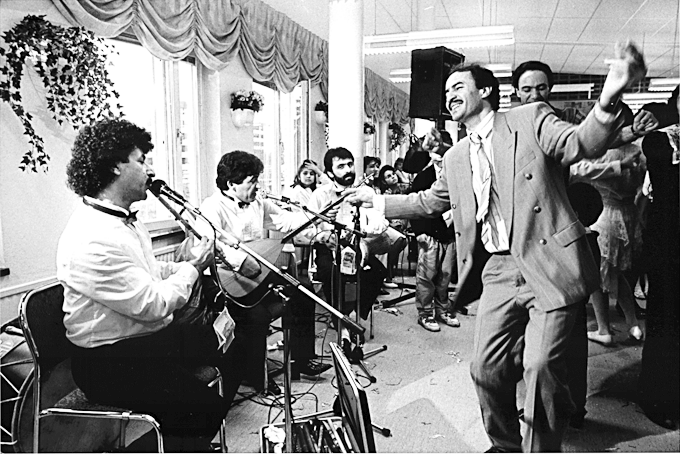Telefon: 08‑5195 5488
E-post: info@visarkiv.se
Besöksadr: Torsg. 19, Stockholm
- Virtual Assyria
- Preface
- The Assyrians as an example
- Assyria – your land in Cyber Space
- Cyberland – Music, Nationalism & the Internet
- With music as a boundary marker
- Christians from the Middle East
- The liturgy of the Syrian churches
- A visit to a musical rebel
- Assyrian music on the Internet
- Expressive specialists
- References
Expressive specialists
The important part played by music in creating a sense of fellowship within minority groups has been mentioned in several places in this study. Where Assyrians in general are concerned, it is obvious that the role of music as an identity symbol is even more important than in many other groups. The "Assyrian national concept", which arose towards the end of the 19th century and became an urgent issue after the First World War, was to a large extent based on the works of author, poets, singers and composers. For West Assyrian liberation champions such as Naum Faik, Juhanon Salman and Gabriel Assad, poetry and music were the means that could unite a divided people. Today this striving for national unity has been taken over by new generation of Assyrians, and the old poems and songs have taken on a wider symbolic meaning. The content of the lyrics often alludes to the suffering of the people throughout history and to a nation which was scattered far and wide in the diaspora, but as a phenomenon the poems also symbolise the early national struggle.
Today's expressive specialists (singers, authors, musician etc. ) in the Assyrian group are given a very important role as interpreters and promoters of the cultural identity. The fact that the President of the Assyrian National Federation is an internationally well-known singer should be seen in the light of the fact that his work as a singer does not only consist of being an "entertainer" – of amusing the party guests. The Assyrians are very well aware of the function of music and song as a creator of cultural identity and a preserver of tradition. The musicians, especially the singers, become important links that can convey the direct and symbolic content of the songs to the audience. The expressive specialists function as transmitters of a cultural identity. In Om vi söker (If we search) Augin Kurt writes:
Idealistic work was a prerequisite for the activities of our newly founded societies in the mid-1970s. The leading active figures were driven by a burning national feeling, which we regard as the most honourable word. During the latter half of the 70s Assyrian societies grew up like mushrooms, since the need of meeting-points was so enormous in these strange surroundings (1996:75f).
But what did they meet round? When Joseph Malki talks about the founding of the Assyrian National Federation, he is anxious to point out the importance of music:
It was in connection with the music that I began to think. Why don't we build societies? And so the Assyrian societies came into the world. Because of the music, you see, people met and so people came to the microphones. And through the microphones they have become leaders. In a way it's the music that has created all this. And the same thing with the founding of the Assyrian National Federation, that was my initiative. I said, why should we see ourselves as retarded people, as people of lesser value. The Swedes say that we can build a federation, we live in Sweden, don't we, and they give us this courage, you see, the Swedish people and the Swedish authorities. A lot of people said, no, we're not ready for it. But I was obstinate and so we formed the Assyrian National Federation.
So you mean then that it was thanks to the music?
Yes, it was thanks to the music. How do we go about it, people asked. Well, the music will solve that problem, I said. Let the music do it. So we began to organise parties in Motala, in Linköping and in Gothenburg where the Assyrians lived. The simple fact is, it all started with the help of the music.
So you could say that by organising parties people were brought together?
Well, that's how we attracted people. And people began to like each other. And began to get stronger ties, and love and relationships and people began to feel less isolated. The isolation was broken, and they felt that somebody cared about them. And music – I think that that is the greatest element one can use to show that people care for each other and have feelings for each other.
(Joseph Malki, interview 3rd March, 1997)
So music "solved the problem". To a large extent the idealistic work that Kurt mentions was a question of organising cultural manifestations and culture days, of getting children's dance groups going, etc, in short, all sorts of activities where music was often the natural centre of focus. A big problem, however, was, and still is, the dearth of competent musicians. As mentioned elsewhere, popular dance music on the zurna and davul has traditionally been played by non-Assyrians, and this was also the case in Sweden. During the last 20 years the zurna-player Ziya Aytekin has been one of the most sought-after musicians, employed both by ethnic Turks and by Kurds and Assyrian/Syrians in Sweden.
Listen to a sample from the CD Ziya from 1994.
According to Aytekin there was a noticeable increase in the number of weddings between immigrants from Turkey in Sweden and Denmark during the second half of the 1980s. The Kurdish and Assyrian/Syrian groups answered for the largest increase, which perhaps can be explained by the fact that these groups also represented the largest influx of immigrants, starting with the huge wave of Assyrian/Syrians during the second half of the 1970s. Another important factor is that there has been far more immigration on political grounds within these groups. Political refugees have not had the same opportunity to return to their homelands without the risk of reprisals from the Turkish authorities. (cf. Lundberg 1994)
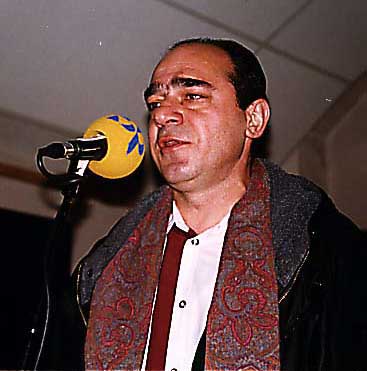
Habib Moussa doing a sound check for a recording at the Mix Music Café in Stockholm on the 8th October, 1997.
Photo: Dan Lundberg.
The Assyrians have also built up a musical life of their own, centred on the early societies. Many new music groups have been formed to fill the need for music at culture days and parties. These groups play dance music of a more modern type, with the mixture of modern and traditional instruments which is so common in popular music in the Middle East today. A modern Assyrian music has grown up in Sweden around the few specialists in the music field, such as Joseph Malki and the singer Habib Moussa from Beirut.
Listen to Habib Moussa, on a recording from 1995.
When Moussa came to Sweden in 1997 he was already an established singer. Through his work in "casinos" in Beirut and via records made in Lebanon, his fame had spread among West Assyrians throughout the world. At the age of 14 he had aroused both dismay and admiration in Syria by singing love songs in Aramaic in public. In Sweden he was welcomed with open arms by the music-starved Assyrian immigrants.
Groups such as Babylon, Shamiran, Ishtar and Nineveh appeared in public and also produced tapes with Assyrian music during the 1970s and 1980s. Nineveh from Gothenburg still give concerts and record Assyrian music. Even in the popular music field there has been a demand for musicians of non-Assyrian origin, particularly for recordings. One example is the Turkish ney-player Ahmet "Haci" Tekbilek, who can be heard in ensembles on many Swedish-produced cassettes with Assyrian music.
Listen to Haci when he plays an improvised introduction, Taqsim, on the cassette "Ha-Nisan Assyrian Choir".
The importance and potential of the expressive specialists is also apparent in the appeal to Assyrians that was published in the magazine Hujådå (June 1997). As a result of economic setbacks which affected the Assyrian National Federation, Ablahad Lahdo wrote the following words in an editorial:
All our literary and artistic personalities are exhorted to intensify their efforts to produce creative works, each one of them within his own sphere – to offer and create resources to support our institutions, in particular the Assyrian National Federation in Sweden. This is not the time for one-sided confrontations and emotional behaviour. Even if we come through this crisis unscathed, there is a risk that we will soon encounter problems of the same calibre if we do not here and now reflect on our present ways of working and thinking.
If we hope to have a strong and healthy institution, we need the forces mentioned above.
We are faced by a great test of our creditability concerning our statement that we feel for our institutions, which we have all helped to create and develop. We therefore exhort all spectators to come up on stage and take part. Because the crisis is so serious that it does not leave any room whatsoever for these spectators just to enjoy themselves and have a good time.
Ninib Ablahad Lahdo, Federation President
Gabriel Assad's activities have been described elsewhere in this study. Since the large-scale Assyrian/Syrian immigration into Sweden in the 1970s, two generations of his successors have emerged. The first generation was part of a circle of "idealists" who were responsible for building up the Assyrian societies which have been described above. The next generation consists of second generation Assyrians who have grown up within the Assyrian group in Sweden.
To read more about Gabriel Assad and national music, go to A visit to a musical rebel.
Joseph Malki
Apart from Habib Moussa, the person who perhaps has had the greatest influence on the development of Assyrian music in Sweden is Joseph Malki from Tumba, south of Stockholm.
Joseph was born in 1948 in Qamishli in Northern Syria. After studying to be a film director in Spain he came to Sweden in 1971.
As a boy in Qamishli Joseph had played music in various contexts and learned to play the çümbus (folk lute), accordion and saxophone. He had also worked professionally as a musician in night clubs ("casinos") in Damascus and later been a member of the Syrian TV Ensemble in Damascus. It was mostly popular music of Middle East type that was played on television and in night clubs, and Malki's job often consisted of accompanying well-known Arabic singers who visited Damascus.
Yes, it was popular music that was played – Um Kaltsum and other well-known male and female singers. But our folk music when I grew up. I can say that when I was 14-15 years old I discovered that hardly anybody sings folk music. It was only Gabriel Assad who sang the nationalistic songs. He was a pioneer in the 20s and 30s. In connection with the French mandate the minorities became more optimistic. They thought they would be able to do something with their lives and with the people. And then Gabriel Assad came.
Did you know him in Syria?
Yes, I used to listen to him when we visited the Cultural Centre. Gabriel Assad was a big influence. He played these oriental scales and talked about our music and about the heritage from the church. He influenced me a lot. I also had the honour of playing with him four or five times on stage. We had formed a little group. I played the saxophone then. We also had violin and rhythm section. Gabriel Assad also played the fiddle with us. We played his compositions.
With his musical knowledge and his contacts with Assad and the national music, Joseph Malki became an important uniting force in Sweden, a spider in the Assyrian web of contacts.
Introduction to Otadou by Joseph Malki. From the CD "Ninib A. Lahdo", 1996.
We organised parties there and I was the only musician. Then people began to flock to the parties and I thought it would be a pity if I should stop at that. I had to go on and do something else. I began to learn a bit more about the music and began to teach other people who were interested how to play oriental music. I discovered that some of them had good voices. I taught them some songs and so it has continued.
Joseph's activities in Sweden have resulted in a large number of records and cassettes, as well as choral music and theatre music and so on. Many of the Assyrian music groups in Sweden are also a direct result of his work. Today he is employed by the Assyrian Music and Theatre Federation, which is part of the Assyrian National Federation.
The aim of the Music and Theatre Federation is to "stimulate Assyrian music and theatre and other activities that belong to these branches". Over the past ten years Malki has run music courses for youngsters between the ages of ten and fourteen, arranged by the Federation. In 1996 he had fifty-five music students. The tuition starts off with children's songs for the youngest children and continues with instrumental music and oriental music theory.
I'm a very optimistic person so I hope that through these courses people will perform this music and do more research and produce new music with the grounding they've received. So I'm very optimistic.
In recent years he has also been involved in the work of collecting material for two music anthologies: one with Syrian Orthodox chants and one with Assyrian/Syrian songs.
A conversation with the musicians in "The Eagle's Nest".
The group Qenneshrin, "The Eagle's Nest", is one of the Assyrian music groups that has sprung out of Joseph Malki's courses.
First we played at the society's parties and then people asked if we would come and play at their weddings and engagements. That's how it started. (Nabu Poli, interview 26th February, 1997)
"The Eagles Nest" is a semi-professional music group with members from Södertälje and Botkyrka, south of Stockholm. The group consists of six lads between eighteen and twenty-three years old. Like most youth bands the group has ambitions and they hope to be able to support themselves as musicians. Only a few years ago the group's activities consisted of meeting at one of the member's homes to play for fun. Since 1996 paid gigs have begun to crop up and the group's activities have changed character.
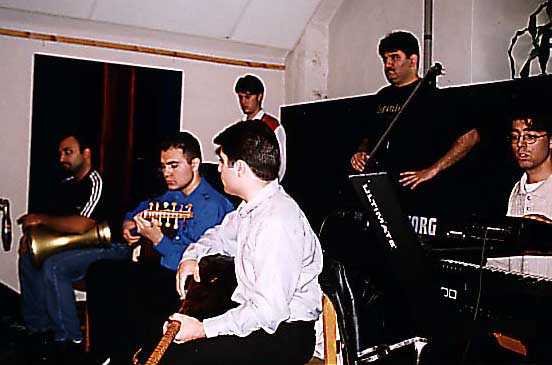
Qenneshrin at the Mix Music Café in Stockholm on the 8th October, 1997
Photo: Dan Lundberg
The members of The Eagle's Nest: from the left, back row, Gabriel Masso – synthesizer, Nasif Kusarji – bass guitar, Nabu Poli – synthesizer, front row, Fadi Haddad – darbake, Yaakob Danho – oud and Emanuel Demir – saz. The band consists of second generation musicians within the Assyrian community in Sweden.
Joseph Malki is proud of his pupils who have attracted considerable attention both within and beyond the Assyrian community during the last year. Among other things they performed at the Stockholm Orient Festival in 1997.
What do you think will become of a group like this?
Well, if they continue to learn more about our music, their musical cultural heritage. Then they can do good things. They can spread the music to many people, since they are good musicians. I trust certain of the musicians in this group, specially Nabuch. I trust Nabuch very much. He is serious and skilful and respectful. He knows the value of his cultural heritage.
Do you think they will be able to make a living from playing their music?
Well, it's up to them and to circumstances. Unfortunately, as it is now they all just play music as a hobby. Nobody lives off it. Nobody can do it full time. But I hope that they'll be able to do so in the future. If we create fine music which makes our people known. Which people can like. Then it would be a good production, then you make a profit. You can arrange concerts, festivals and tours. What's well worth noting is that Sweden is a centre where our music can grow. I can say as a fact that our folk music has taken shape in Sweden. And that it has even been spread to our homelands. And they are very proud even in our homelands, since they feel that they now have folk music of their own which they recognise. I've noticed it and we must continue along this path, but we need support from the authorities, from the people. These lads – everyone that plays folk music – must have support. To spread this music further.
They play at parties, engagements and weddings, but where else do they play?
Sometimes at exhibitions, art exhibitions. Invitations from cultural institutions, for example, like Södertälje Day. In certain contexts, then they help out. And that's what we've done ever since we came to Sweden, we've played in a lot of centres, at many symposiums, many festivals and concerts.
(Joseph Malki as above)
If one compares "The Eagle's Nest" with young Swedish music groups, there is an important difference. A heavy burden of expectations rests on their shoulders. When Nabu's father, Aziz Poli, was asked what he would do if Nabu came home and said he was going to stop playing Assyrian music and start to play hard rock instead, he answered with a single word: Catastrophe!
But the risk that "The Eagle's Nest" should become hard rockers is non-existent. A far greater problem, which is often discussed in Assyrian musical contexts, is the influence from Turkish and Arabic music which poses a constant threat. Arabic and Turkish pop music is spread to Assyrian youngsters in Sweden through satellite TV channels and other media, and this is reflected in the repertoire of the youth bands.
The vast supply of Arabic/Turkish music, combined with the fact that Assyrian music has few distribution channels, means that there is a risk that the music will become "Arabified" or "Turkified".
As Emanuel Demir points out, there isn't very much Assyrian/Syrian music anyway.
(Interview with Emanuel Demir [ED], Gabriel Masso [GM] and Nabu Poli [NP], 26th February , 1997).
ED: We know nearly all of it already. But to play at weddings and that sort of thing one has to be more international, so to speak. You have to play in Arabic, Syrian, Assyrian and Turkish style.
NP: And Kurdish too, sometimes.
ED: Yes, sometimes Kurdish, in fact
GM: But we prefer not to play Kurdish music.
DL: Why's that?
ED: It's to do with history.
The reason why they are not keen on playing Kurdish music is because of the political conflicts which still exist among the Christian minorities and the Kurdish Muslims, particularly in South East Turkey. But since many Assyrians lived in Kurdish villages where Kurdish music and language dominated the folklore, there is still a need for Kurdish repertoire at parties. "It depends on the family", says Nabu Poli, and continues, "some families grew up close to Kurds, so then we have to know their music. Otherwise they get Kurdish musicians for their weddings". What is important in this context of course is that the audience, even if they are Kurdish-speaking, are Assyrians. It is hardly likely that a Kurdish family would want Assyrian musicians at their parties.
The situation in Sweden naturally differs from that in the Middle East since here Assyrians with different origins meet in the same societies and live in the same areas. Here there are no Kurdish/Assyrian or Turkish/Assyrian regions; everyone is part of the same community. This naturally puts special demands on the musicians' repertoire. But the musical diversity which arises when the same musicians are employed by many different ethnic groups is not unusual in Turkey and the Middle East. An important difference, however, is that there the musicians themselves are seldom part of the same social sphere as the audience but have been brought in from outside. This is often the case, for instance, with mashroqo and dawole players who are often of Gypsy origin. The mixture of musicians in Qenneshrin, with origins in Turkey, Syria and Iraq, in a way mirrors the Assyrian group in Sweden as a whole. In a multicultural group such as Qenneshrin the various individuals are representatives for their cultural backgrounds. It is natural for Emanuel Demir, who grew up in Turkish/Kurdish surroundings, to contribute Kurdish and Turkish music to the group's repertoire. In the same way Gabriel Masso, who comes from Syria, has become the group's expert on Arabic music.
DL: How did you get hold of this repertoire – Kurdish, Turkish, Arabic? You must be on the lookout all the time? Isn't that so?
ED: Yes, of course, we listen.
GM: We see what's being asked for at parties and what's popular. And then we learn those tunes.
ED: It's mostly dance tunes. That's what people want at their parties.
NP: If a new cassette comes out with good party music, then we buy it straight away.
DL: Then what do you do in the band, do you use notated music or do you learn it by ear? NP: By ear, by ear mostly.
ED: The lads can read music a bit. Gabi, for instance, he reads music well. Sometimes when a singer comes from outside and it's an emergency Singers sometimes bring their own music. Perhaps it's their own tunes which are not on the cassette
If we return to the question as to whether there is anything Assyrian in the music itself, we realise that the whole issue is somewhat complex. Obviously it is possible to find certain ways of playing and styles of phrasing and perhaps even instrumentation which distinguishes Assyrian music from other styles from the same region. But a very large part of the music is used by several different population groups. The lads in Qenneshrin seem to be fairly well in agreement that the strongest "Assyrian" expression lies in the lyrics. Just as an English tune which is given Swedish lyrics actually becomes Swedish in a certain sense, so a Turkish tune with Assyrian lyrics becomes Assyrian. But in the debate on what is genuine and what is not, Emanuel Demir considers that it can also be argued that "people are scattered all over the world. And they also have different origins. People that come from Turkey, if you tell them to sing an Assyrian-Syrian song then it will be a Turkish song. A tune that they have done but which is strongly influenced by Turkish music. When people are so scattered, then you get a mixture and a bit of everything".
Maybe it is the mixture itself that is "genuine"?
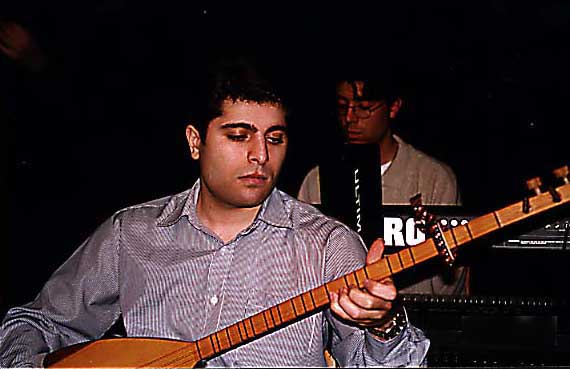
Emanuel Demir and Nabu Poli at the Mix Music Café on the 8th October, 1997.
Photo: Dan Lundberg.
When we listen to the members of The Eagle's Nest, it is possible to draw the conclusion that the new situation and the increased self-awareness among Assyrians in the diaspora has also changed the attitude to music. Young people do not seem to have as great a need as the previous generation to prove the music's "genuineness".
One would perhaps also be inclined to assume that the music rebel Gabriel Assad would be dissatisfied with the development towards a more Arabic/Turkish oriented profane music. But when asked what he thought about the development of Assyrian music he answered, on the contrary, that he is highly satisfied and that he is proud over what has happened. The main thing for Assad is that people can now play Assyrian music freely (Gabriel Assad, interview 10th March, 1997).
The efforts of Assad and other people have truly borne fruit. Profane music-making, which was condemned as sinful by the Syrian Orthodox church, is now a valid possibility for Assyrian youngsters today.
DL: Is it all right to be a musician then, for you, in the circles which you move in?
NP: You mean the attitude towards musicians?
GM: It's getting better, it's getting more positive. Before, if a man was a musician then he had a bad reputation, do you understand?
ED: Now the music is respected more.
NP: So it's not like it was before.
ED: They say that you should go and get an education. That we shouldn't keep playing at parties and things like that. Wasting time. That's what many parents say. But deep down they're proud. – OK, they play music and people respect them for that. Yes, it's a different attitude to it.
DL: What about among your friends then?
ED: Oh, they think it's great
GM: They wish they were musicians. Since they grew up here they've lived Western lives. DL: Why does one become a musician?
GM: A gift from God. (giggle) That's the way it is for me anyway.
DL: But as a musician you can feel proud that you can do something that others can't. Isn't it like that for you? Does it make any difference whether you're Assyrian or Swedish or Finnish?
ED: No it doesn't. Maybe I do want to be a musician in the future. But it will have to happen by itself. You don't just think: Oh, I want to be groovy, now I'm going to learn music. You live with the music. If you put the TV on you hear music, if you put the radio on you hear music, you hear music at home, you hear music everywhere. And suddenly you think, why not give it a try? And perhaps the interest grows and in the end perhaps you have a goal or a purpose with the music. And then you get somewhere.
DL: But when you are only nineteen there aren't so many things you can be. You can't be an engineer or a pilot or whatever. But you can be a musician.
NP: It has a certain status, so to speak, but still, if you compare with an education People ask you what you do, what you are studying or if you are studying anything. If you say yes, I'm studying engineering or economics or something, that raises your status. – Oh, he's studying. But if you say you're a musician or something like that, then it's still this
At the same time there are big differences between different categories of musicians. Traditionally, singers have had better status than orchestral musicians. The singer is an artist, he is the one who attracts people to an event. His name is on the posters. This is also reflected in the fees. A relatively well-known singer often gets up to five times as much for a performance as his accompanist. Singers therefore have higher status than musicians.
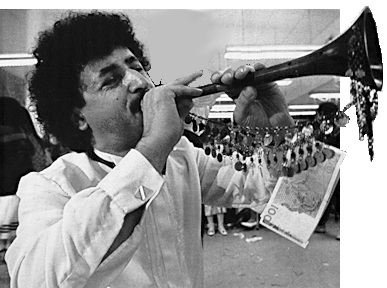
Ziya Aytekin has been given a couple of hundred crown bills for playing at a wedding in Hagsätra, south of Stockholm.
Photo: Olof Näslund. Documentary Agency.
The position of the folk musicians, the mashroqo and dawole players, is somewhat special and rather ambiguous. In the traditional context these musicians belonged to the lowest social class with very low status. At the same time the audience – in this case the wedding guests – give the musicians tips during the evening, and thanks to this custom this particular category of musicians can earn a large amount of money from their music-making. A skilful mashroqo player can make thousands of crowns just in tips in an evening. Tips (bashish) are usually given to the mashroqo-player and can also be given to the singer if someone wants to order a special tune, but tips are seldom given to orchestral musicians. But even if the status of musicians has risen in recent years, not least in the diaspora, the lads in Qenneshrin sometimes have mixed feelings about their future.
GM: So I think, musician, what's that? I've been wasting my time. But if you are a singer then you earn good money, then you think this is really good, both financially and as a hobby and you've also got better status. Yes, status, a singer has much higher status, that's how people think. I think that way too sometimes, that it's all a matter of money. But you hear that doctors earn a lot of money, lawyers earn money so you think, OK, I'll become a lawyer, then I'll have status. I'll earn a lot of money. It's all about money.
DL: But there are two worlds as well, aren't there? At least that's how it was for me. That there is a grown up world, and there it's doctors and lawyers and engineers that count. But there's a young people's world as well, and the values are not quite the same.
ED: No, it's not the same values, but deep down you know that it's two worlds. But you kid yourself. Deep down you know how things really are.
DL: If you think about the future then. If you imagine the Qenneshrin group or yourselves in thirty years' time. Will you still be playing together then?
ED: The chances are minimal. (laughter)
NP: You never know.
ED: We'll most probably still be involved in music and that sort of thing.
DL: Mm, then you will have grown-up children of your own.
GM: But I think, I think that the group will last. Unless you get married and have to move from here. That's the sort of problem that can crop up. I think we're a bit like some sort of family, do you understand? That's how I feel.
NP: Very, very close friends.
They dream about the future, but life as musicians seems as unreal for Nabu, Gabi and Emanuel as it does for any Swedish youth band. But the fact that the dream exists constitutes a new starting point for Assyrian musicians' identity.

